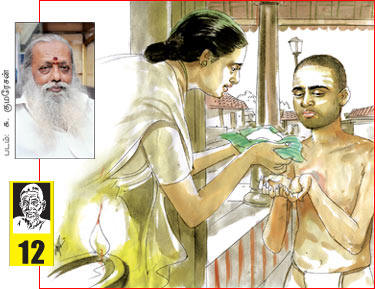12Ramanamaharishi20100922.html
Sakthi Vikatan
-
22 Sep, 2010
2010-09-22-part1
& 2.
SriRamana
Maharishi
Surrender to Aṇṇāmalai
When Mahan walks under the sun, a cloud moves to give him shade; it
protects him throughout the sunshine hours. The frothy rapids of a river
approaching his house bends and runs a safe distance away in a different
direction. When he walks in the forest, the cheetah, the lion, the male
elephant…take an intense look at him and retreat.
Venkatraman of Madurai, now Bālaswāmy of Tiruvannamalai was deep in Mōṉa
Tapas (Silent Tapas); there were obstructionists and facilitators. A
Gurukkal
in Aṇṇāmalaiyār Shrine gave not only Prasada from the temple, but also
brought home-cooked meals; He begged and made him eat the meals.
Bālaswāmy’s loincloth was ragged and torn. The loin cord was partly ripped and
caused pressure sore in the hip. Gurukkaḷ
tore his dhoti into a loincloth, applied it on a
cord
away from the sore. He said,” Kārttikai month, mid-Nov to mid-Dec) is
due soon. There will be an assembly of devotees. If you are naked, the
police will condemn such appearance and may even arrest you. Keep the
loincloth on you. That youngster, the future Ramana Maharishi, had no
concern about the loincloth in place or absent on his body. To
Bālaswāmy, wearing or not wearing clothes was not an important issue.
For Kārttikai month Brahmōṛsavam,
people in droves came to Tiruvannamalai. A section of the visitors
attracted to Bālaswāmy for an unknown reason saw him and sat before him
for a while and left.
 Uththaṇḍi
Nāyaṉār attended the Kārttikai festival from the village of Poṉmaṇi,
near Vanthavāsi. He was a scholar in spiritual matters. He was hobbled
with life’s discomposure and worries. Peace was episodic. Anger burst
forth sometimes as a sign of past-life Vāsanas. Shame and worry
accompanied his anger. He
was critical of himself stating, ‘What kind of birth is this?’ Sometimes
he was so effulgent that his behavior deserved worship.
Uththaṇḍi
Nāyaṉār attended the Kārttikai festival from the village of Poṉmaṇi,
near Vanthavāsi. He was a scholar in spiritual matters. He was hobbled
with life’s discomposure and worries. Peace was episodic. Anger burst
forth sometimes as a sign of past-life Vāsanas. Shame and worry
accompanied his anger. He
was critical of himself stating, ‘What kind of birth is this?’ Sometimes
he was so effulgent that his behavior deserved worship.
When he saw Bālaswāmy, surprise overtook him.
O My, here is a beatific ecstasy on its rise. Standing here
causes happiness. I experience tranquillity, never had by me. If his
external tranquility causes so much comfort, the inside must have great
ecstasy.
‘God… Aṇṇāmalaiyārē…! It is for this moment, I performed austerity all
these years. I was convinced this will never be available to humans. I
suspected Divine Darśan was mere fantasy. He is not a mere youngster. He
is a Jñāṉi. He is not just a boy. He is the divine plenitude. This is not
mere human body. It is a repository of divinity.
Heart and soul of Uththaṇḍi
Nāyaṉār
melted. Returning home never occurred to him. He slept near him,
provided small help and saw that no one bothered him.
This was of great help to Bālaswāmy. When Bālaswāmy and Uththaṇḍi
Nāyaṉār were under the
Madhuca indica,
one woman named Rajammal desired to offer food. She was young. She
belonged to
the courtesan class. She came with a related boy, offering
food. Since she was a nubile girl, she could not touch Swamy and so she
brought a related boy with her. After a while, he stopped from coming.
Rajammal did not give up.
She came with her elderly mother, who would touch to wake Bālaswāmy and
offered food. Bālaswāmy accepted a small share of the food. Uththaṇḍi
Nāyaṉār
also received food.
Seeking no recompense, Rajammal, motivated by an inner urge, performed
service to Bālaswāmy, which made it possible for a boon. Though she was
born in the courtesan class, a rich man fell in love with her and
married her. He treated her with respect. Rajammal’s daughter married
high. The stigma of Courtesan class disappeared from their family
history.
Raththinamal, wife of Velurar offered food to Bālaswāmy. She used to
feed him by opening and putting the food in his mouth.
A woman holding it as a duty to offer food to the Sadhus extended a
dinner invitation to Bālaswāmy. He did not accept her invitation. He by
sign language told her, ‘I will eat only by begging. I will not go to
anybody’s house as a dinner guest.’ The woman left unhappy.
Bālaswāmy got up, walked along the curbside of the street. He stood
before a house and clapped his hands. That was the home of the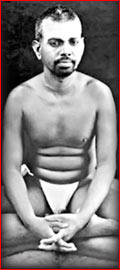 Gurukkal. The woman of the house came running and served him food. She
felt that her own dead son came back alive. When the food fell on his
hands, he ate it without tasting it, wiped his hands on his head and
walked by the side of the street.
Gurukkal. The woman of the house came running and served him food. She
felt that her own dead son came back alive. When the food fell on his
hands, he ate it without tasting it, wiped his hands on his head and
walked by the side of the street.
It was four months since he came to Tiruvannamalai. He never had a body
cleansing (shower or bath). A woman forcefully applied bath-oil on his body, scrubbed him
with soap pod wattle powder and cleansed him with water.
That is the first bath since he arrived in Tiruvannamalai. Since
then, he took no bath for one whole year. One devotee arranged for a
shave, which he refused.
Vīrasikāmaṇi
Paramāchāriyār was a 13th Century Sadhu. He performed many
wonders, having devotion to Aṇṇāmalaiyār. When he shuffled off his
mortal coil, he was buried in Tiruvannamalai with installation of a
Lingam and a grave. He earlier built a Mutt (monastery) around his
future burial site,
after buying the land around it.
His progeny moved away, and the Mutt became Kuṉṛakkuḍi
Āthīṉam.
In that Saiva Mutt, the Thambirān
(Non-Brahmin
monk of
Śaiva
mutt)
had a disagreement, moved from there and performed Pūja
to Gurumūrththam
(God as Guru) in Tiruvannamalai. He spent his time with the founder of
the Mutt. In Tiruvannamalai, they sang Thēvāram,
Thiruvāsakam…
received donated food and articles with which they maintained their lives.
Annamalai was the name of Thambirān.
When Annamalai Thambirān was walking towards the Tiruvannamalai temple,
he saw Bālaswāmy meditating in silence under the Iluppai tree.
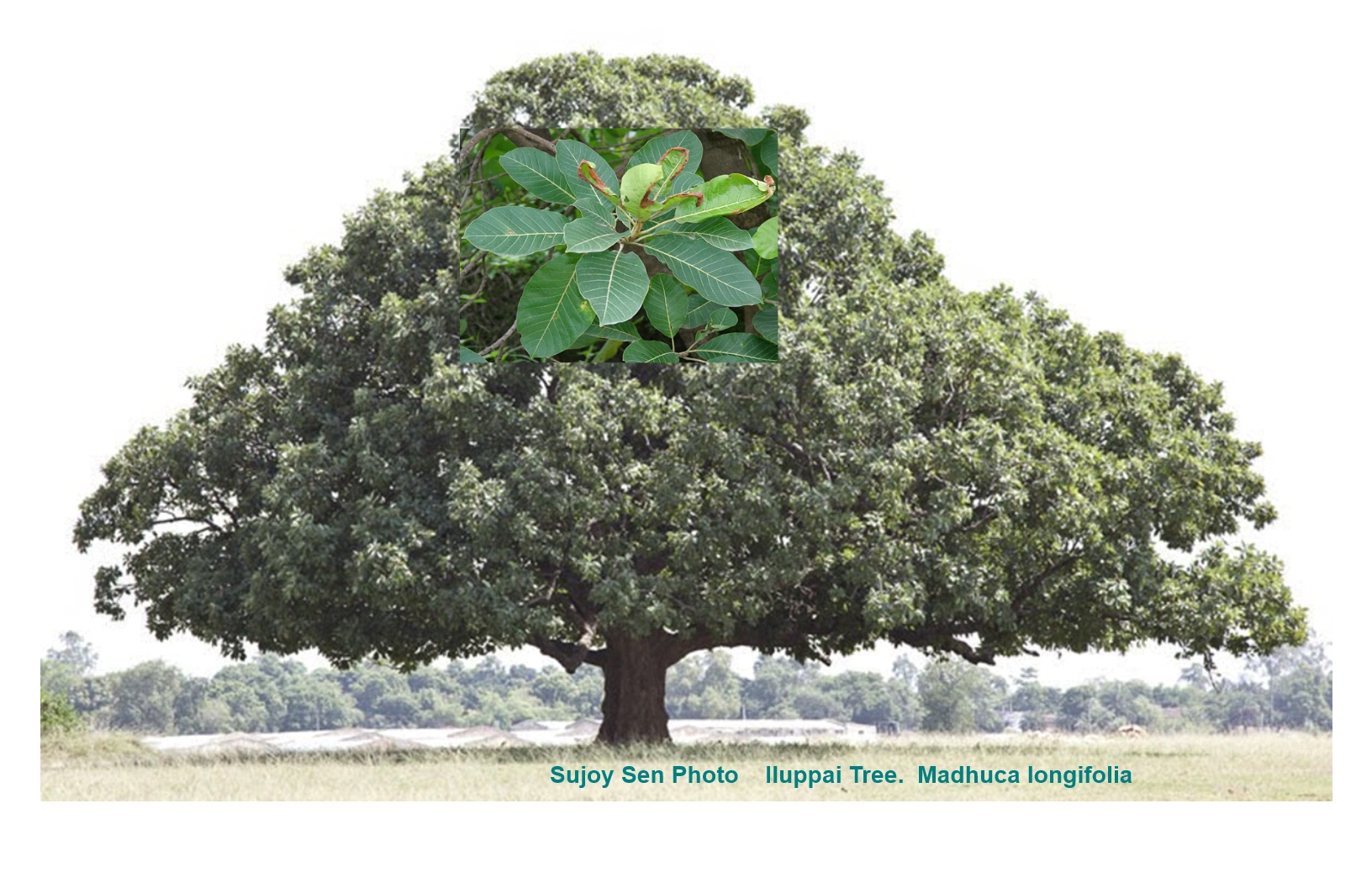
Bālaswāmy drank a mixture made of Kanghi (porridge), Pāyāsam
(Sweet milk and boiled rice), fruit juice only once a day. That he found
was enough for him. He had enough food for life sustenance. He never
needed tasty foods. It was natural for him to be in ecstatic meditation.
There was no mind (with likes and dislikes…). There was no concern about
his physical body. Therefore, he had no concern about food. He did not
bother with clothes.
Aṇṇāmalai
Thambirān wanted to smear his head with oil, clean it with wattle
detergent powder and give him a bath. He wanted to perform ritual
ablution with application of sandalwood paste. He prepared for these
events. These were a great nuisance for Bālaswāmy.
Sakthi
Vikatan
-
22 Sep, 2010
2010-09-22-part2
= Kanchi Mahan, the Lord of Compassion
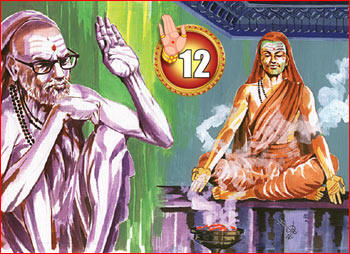
Pattābhi, the confidant of Maha Periyava and the close associate of
Kanchi Sankara Mutt had shared a narrative of horripilation with us.
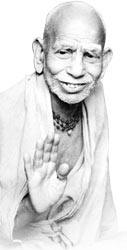 “When
Periyava came to the Mutt to ascend the Pitam
(Papal chair), difficult circumstances prevailed. The Mutt had to borrow
money from the bank for daily expenditure. Periyava brought this to the
attention of my grandfather, Mahāliñgaiyar.
Since they did not have the means to buy vegetables for cooking, they
scrounged around for Orange skins and used them to prepare Sambar.
“When
Periyava came to the Mutt to ascend the Pitam
(Papal chair), difficult circumstances prevailed. The Mutt had to borrow
money from the bank for daily expenditure. Periyava brought this to the
attention of my grandfather, Mahāliñgaiyar.
Since they did not have the means to buy vegetables for cooking, they
scrounged around for Orange skins and used them to prepare Sambar.
Those days, the farmers used to give paddy (unhusked rice), unripe plantain fruits, plantain stem, plantain flower…or whatever they could
afford. They could not afford to offer cash. Periyava said, “we should
not expect anything from them.’
Periyava came to ascend the papal chair in teenage years. Sri Mahāthēvēnthira
Sarasvati died, so he did not learn from Ācārya. Periyava grew up as a
‘Suyam Āćārya Puruṣa (Self-taught Acharya)’ as seen in the Vaishnava
tradition. On the first day of installation, Periyava performed Gayatri
worship and on the next day, all the rites intended for the Guru.
Those days, there was a saying in the Brahmana households, 'Country one
half; Nangavaram is the other half.’ What is the meaning?
Nangavaram Jamīṉ Rajappa Aiyar owned 15,000 acres of land on the banks
of Kāvēri River. With passing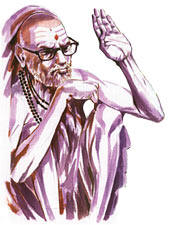 time, all were gone. The family members established a Pātasālai (school)
and arranged for Vidvāṉs for teaching and pupils learning religious
texts. Periyava, the student, mastered all the subjects and books. The
saying was that Nangavaram and Udaiyarpalayam Jamīṉs prepared for the
education (=
vittiyāppiyācam)
of Periyava.
time, all were gone. The family members established a Pātasālai (school)
and arranged for Vidvāṉs for teaching and pupils learning religious
texts. Periyava, the student, mastered all the subjects and books. The
saying was that Nangavaram and Udaiyarpalayam Jamīṉs prepared for the
education (=
vittiyāppiyācam)
of Periyava.
Periyava’s tapas, pilgrimage, lecture and his fame became well known to
the people; the Mutt also became prosperous. Knowing his greatness, there
were many people coming to know of it. The Mutt became prosperous. With
financial matters, he was very careful. He did not accept donations
because the VIPs and the rich wanted to support his Mutt monetarily. Whom
to take from and whom not to take from, he knew. Those days, a very rich
man wanted to contribute 10 million rupees. He is the Mahan who refused
to accept this largess.
If contributions in fruits, rice, pulses were made…he accepted them.
Hard cash, he never touched. He walked from one village to another
village on his pilgrimage. He did not look for luxury or facilities such
as bus stand, school, the shade of a tree, the river bank…Wherever he
found a place to stay, Periyava stayed there.
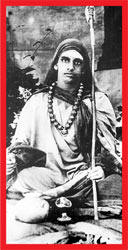 We
stayed with him during his travels. We take rice, dahl…with us for
cooking. Once when we crossed the Chittoor Check post, the authorities
confiscated the last bag of rice. Periyava said, ‘The Government is
asking for it; give it.’ We were worried about the next meal. When the
chief minister of Andhra Pradesh heard about it, he was shocked. He not
only asked the authorities to return the bag of rice, but came in person
to apologize to Periyava and ask for forgiveness. That was a great
respect towards Periyava.
We
stayed with him during his travels. We take rice, dahl…with us for
cooking. Once when we crossed the Chittoor Check post, the authorities
confiscated the last bag of rice. Periyava said, ‘The Government is
asking for it; give it.’ We were worried about the next meal. When the
chief minister of Andhra Pradesh heard about it, he was shocked. He not
only asked the authorities to return the bag of rice, but came in person
to apologize to Periyava and ask for forgiveness. That was a great
respect towards Periyava.
Periyava said the CM, ’What is there for an apology and forgiveness?’
The government servants did their job. We should not find fault with them.
He blessed the CM saying, ‘Your love and respect for the Kanchi Mutt
should remain unchanged for ever.’
NTR Chenna Reddy, MGR…were great devotees of Periyava.
Pattābhi commented, ‘It is not
that they have a high regard for our Mutt; we should earn their trust
and safeguard it in our Mutt. He also mentioned about the interactions
between Periyava and other Mahāns.
Mahan Tirukkōvilūr
Jñāṉdagiri
Swāmygaḷ
lived in a place called ‘Thapōvaṉam.’ He knew the past, the present and
the future. He dispenses Grace to many devotees and saved them, from
where he sits. He always had a smiling visage. He is a Jñāṉi endowed
with Divine qualities. He was the root cause (primary mover) for the
most popular Nāmasaṅkīttaṉam (= memorial services = nāma-caṅkīrttaṉam)
Once the devotees worried about Mahāṉ
Tirukkōvilūr
Jñāṉdagiri
Swāmygaḷ.
Swāmygaḷ sat in one place and remained with no movement. All were
worried about him. That too, he was motionless like a statue for five or
six days. That concerned everybody.
The devotees did not know what to do and who to seek help from. Some
suggested, ‘All of you go to Kanchi Periyava and tell him, asking for
suggestion. They went to Periyava and told him.
 Periyava
listened to them intently and informed them, ‘He is in Samadhi. Light up
some smoking incense sticks. That is like a ceremony before temple
worship. He will snap out of Samadhi. The Bhaktas were happy.
Periyava
listened to them intently and informed them, ‘He is in Samadhi. Light up
some smoking incense sticks. That is like a ceremony before temple
worship. He will snap out of Samadhi. The Bhaktas were happy.
Knowing that Swāmygaḷ was in no danger, they ran back to Tirukkōvilūr.
According to Periyava’s instructions, they raised smoke from the incense
sticks and made ceremonial offerings.
After that, Swāmygaḷ came out of Samadhi.
Once, when Periyava went to Tiruvaṇṇāmalai,
he performed Giri
pirataṭciṇam (Mountain circumambulation from left to right), accompanied
by five people. A little while later, a congregation of Bhagavan
Ramana’s devotees were coming from the opposite direction. Seeing
Periyava, they paid homage and said, ‘We are on our way to see Bhagavan
Ramana who we were informed was in the Āśramas.’ In assent with them,
Periyava shook the head, said, ‘Is that so?’ offered blessings to them
and continued his walk.
The Ramana devotees hesitated a little and continued their journey. They
were unhappy because they did not enquire about the health of Ramana and
that Periyava expressed no interest in them. He did not identify himself
as Periyava.
The devotees ascended the mountain, presented alms to Sri Ramana
Bhagavan, mentioned about meeting Periyava on the way and expressed
their unhappiness.
When he heard their story, Ramana laughed loud, and said, ‘Have you lost
your marbles? We spoke before. We are now talking. You are unhappy.
About what?’ They stood there spellbound.
I was moved when an 88-year-old married woman (with living husband) told
me this episode.
Kanchi Periyava and Sri Ramanar are great sages. When we found they were
always in conversation with each other, our tenderness and happiness
knew no bounds.
Paul Brunton came to see Maha Periyava to discuss spiritual topics.
Periya said, ‘He is on a spiritual path and I am in Karma mārga. The
person who could answer your questions is in Tiruvannamalai.
He could clear your doubts. ‘He sent Paul on his
way to Ramana. Paul Britton came to Ramanar, cleared all his doubts,
became his pupil and wrote a book.
If Periyava and Bhagavan Ramanar did not have mutual love, could this
have happened? In totality, Kanchi Mahan and Sri Ramana Bhagavan brought
great blessings to our country.
|
-Darśan will
continue |
|
